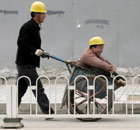Government and Policy
China's elections won't be Western-style
By Zhu Zhe (China Daily)
Updated: 2010-03-20 08:11
 |
Large Medium Small |
Candidates are 'all equal,' regardless of their money
Beijing - The latest revision to the country's Electoral Law, which grants rural residents the same rights as their urban counterparts to elect deputies to people's congresses but does not expand direct elections, shows China will adhere to its own mode of development instead of adopting Western-style elections, a top legislator has said.
"Different countries have different election rules and a socialist China won't follow Western election campaigns," Li Fei, deputy director of the legislative affairs commission under the Standing Committee of the National People's Congress (NPC), the country's top legislature, told China Daily following the adoption of the latest amendment to the Electoral Law last Sunday.

Li, who has been leading the revision, said some people want to expand direct elections, but the current priority is to perfect existing direct elections at county and township levels.
Whether in terms of justice or fairness, a society must pay more attention to "substantial democracy", which in China means that there should be representatives from all areas, ethnic groups and walks of life, Li said.
"Western-style elections, however, are a game for the rich. They are affected by the resources and funding that a candidate can utilize. Those who manage to win elections are easily in the shoes of their parties or sponsors and become spokespersons for the minority," Li said, referring to Western elections at the national level.
"As a socialist country, we cannot simply take the Western approach."
"Such rules raise the threshold for election. The mechanism makes it very difficult for poor people to stand for election, but this system is in line with its capitalistic social nature," Li said.
But in China, the election of deputies to people's congresses do not take into account candidates' assets.
"All of those who have the right to receive votes are equal," Li said.
As early as 1953, when China conducted its first democratic election, the Electoral Law already stipulated that all costs of elections are covered by the national treasury, including costs of setting up polling stations and printing ballots, as well as possible spending on meetings between candidates and voters, he said.
The latest amendment to the Electoral Law stipulates that the local electoral committee should ensure that deputy candidates meet voters.
Currently, the option of such meetings is there, but it is not a requirement.
Confining the meetings within local electoral committees are also aimed at ensuring equality, Li said.
"We set up a system to ensure all candidates are equal, no matter who they are or where they come from."
With the rapid development of Chinese society, a number of wealthy people are turning to political status, as certain positions of public office can help them voice their opinions and safeguard their wealth better, Li said.
"But we need to be particularly careful. We must ensure people from all sectors have their voices heard. We cannot allow individuals to hold political influence through their resources," Li said.
He said the existing people's congresses can ensure a wide representation and help keep society stable.
"Historically, the Chinese people have suffered a lot from instability," Li said.
Keeping direct elections at the county and township level also makes it more convenient for voters to know their candidates, Li said.
"The priority at the moment is to perfect existing direct elections, instead of expanding it," he said, citing some of the latest changes in the Electoral Law.
The latest amendment requires "both rural and urban areas to adopt the same ratio of deputies to the represented population in elections of people's congress deputies".
China Daily












